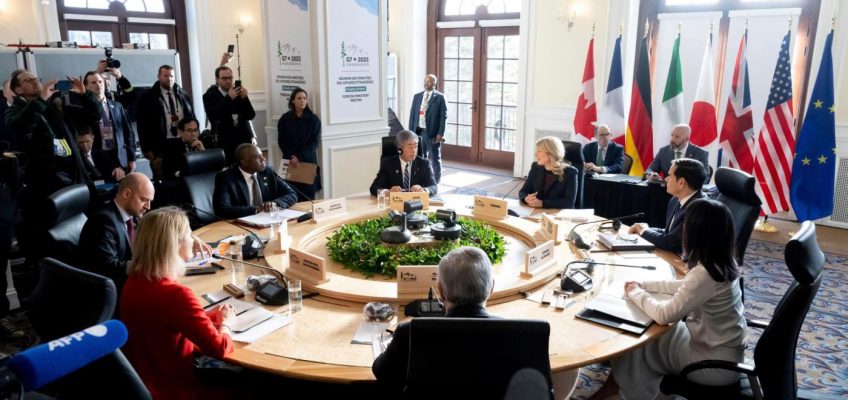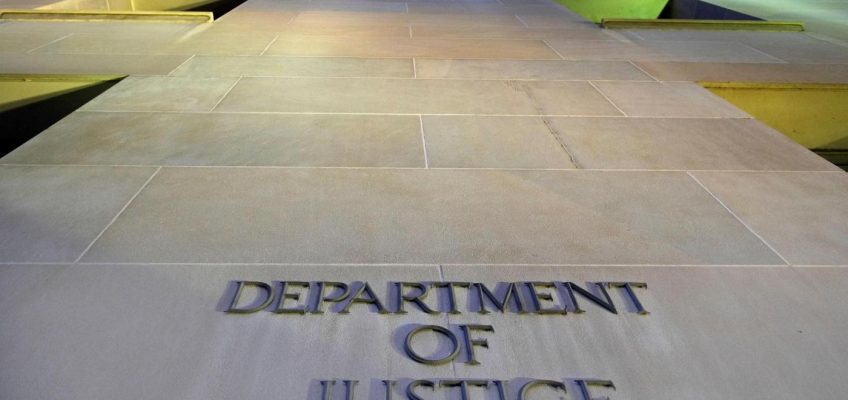By MATTHEW LEE, Associated Press Diplomatic Writer
LA MALBAIE, Quebec (AP) — Top diplomats from the Group of 7 industrialized democracies on Friday were wrapping up their final day of talks that have been overshadowed by U.S. President Donald Trump’s trade and foreign policies as well as his repeated taunts toward host Canada.
Despite the tensions, diplomats signaled they would reach consensus on a final communique after hours of late-night negotiations. Diplomats from three countries said they believed they were 99% of the way toward completing a joint statement that would reflect the group’s positions.
“There is a great deal of unity within the G7,” Canadian Foreign Minister Mélanie Joly said Friday. “We talked about many different things. … We support the U.S. proposal for a ceasefire, which is supported by the Ukrainians, and we are waiting for the Russian response.”
British Foreign Secretary David Lammy said the group arrived at common positions on Ukraine, the Middle East, wars in Africa and Chinese activity in the South China Sea.
From left, European Union foreign policy chief Kaja Kallas, Japanese Foreign Minister Takeshi Iwaya, British Foreign Minister David Lammy, French Foreign Minister Jean-No’l Barrot, Canadian Foreign Minister Melanie Joly, US Secretary of State Marco Rubio, German Foreign Minister Annalena Baerbock and Italian Foreign Minister Antonio Tajani pose for a photo during the G7 foreign ministers meeting in La Malbaie, Canada, Friday March 14, 2025. (Saul Loeb, Pool Photo via AP)
“All of that has united us,” he said. “There will be strong language on all of these issues. So this has been a unified conference in which we have found common ground. And I’m pleased at the effort and the sense of warmth that exists across the partners in the G7.”
Communique or not, Trump has thrown the bloc’s once rock-solid unity into disarray by imposing whopping tariffs on steel and aluminum and threatening to up the ante with additional levies if there is any retaliation.
All G7 members are affected by the tariffs but perhaps none more so than Canada, the only one that borders the United States and the only one that Trump has personally antagonized with repeated derogatory comments about it becoming the 51st state.
The escalating trade war further strained relations between the U.S. and its closest allies, which have already been shaken by Trump’s position on Russia’s war in Ukraine.
U.S. Secretary of State Marco Rubio, on his first official trip to Canada and his first to a G7 event, heard a litany of complaints as he met with the foreign ministers of Britain, Canada, France, Germany, Italy and Japan.
Many of them, notably the Japanese, appealed to Rubio to use what influence he might have with Trump to spare their country from harsh trade treatment. But Trump has said he will not relent.
“We will put maximum pressure on the Americans, and meanwhile, will work on looking for off-ramps,” Joly told reporters Friday. “The Trump tariffs are going to hurt Americans. That’s our message, that’s our approach.”
How a meeting between U.S. and Canadian diplomats went
Rubio met separately with Joly, who said Friday that their discussion had been “frank” — diplomatic code for “blunt.”
Canadian Foreign Minister Melanie Joly, left, and US Secretary of State Marco Rubio pose for photos on the sidelines of the G7 foreign ministers meeting in La Malbaie, Canada, Friday March 14, 2025. (Saul Loeb, Pool Photo via AP)
“I wanted to be able to have a frank conversation,” Joly said. “Of course, Canada’s sovereignty is not up for debate and we had a long conversation on tariffs and trade.”
Other than those comments, there was little, if any, information to emerge about Thursday’s closed-door discussions. Friday’s sessions were shortened due to Joly’s need to depart earlier than planned to attend soon-to-be Canadian Prime Minister Mark Carney’s swearing-in ceremony and first Cabinet meeting.
After Trump reiterated in the Oval Office on Thursday that “Canada only works as a state,” Joly stood firm.
“What I said to the secretary is that Canada’s sovereignty is not up for debate. Period,” she said Friday. “There is no argument. There is no conversation about it.” She added, as if addressing him, “You are here, you respect us, you respect our sovereignty, you respect our people. Period.”
Rubio earlier had played down Trump’s comments, saying the president was only expressing what he thought would be a good idea. The G7 “is not a meeting about how we’re going to take over Canada,” he said.
Joly noted that many of the allies gathered at a snowy resort in La Malbaie, Quebec, thought Trump’s comments were a joke.
“I said to them this is not a joke — Canadians are anxious, Canadians are proud people, and you are here in a sovereign country, and so therefore, we don’t expect this to be even discussed, clearly not laughed at,” she said.
German Foreign Minister Annalena Baerbock said G7 nations should avoid panic and posted a message of support for Canada on X, featuring a photo of her and EU foreign policy chief Kaja Kallas. “We’ve got your back, @melaniejoly,” she wrote. “#Canada #Solidarity.”
Allies support U.S. plan for peace in Ukraine
While the agenda for the G7 meeting included discussions on everything from China to the Middle East and Africa, the possible 30-day ceasefire in the Russia-Ukraine war that Rubio helped broker earlier in the week was one of the biggest topics.
Related Articles
Trump will visit the Justice Department, months after his criminal prosecutions were dismissed
Hundreds of federal offices could begin closing this summer at DOGE’s behest, internal records show
The Latest: Senate has just hours left to avoid a partial government shutdown
Watch live: Dr. Oz at Senate with pitch to oversee America’s health insurance programs
Senate works to avert partial government shutdown ahead of midnight deadline
Ukraine agreed to the U.S. proposal, and Russian President Vladimir Putin said Thursday that he agrees in principle but set out a host of details that need to be clarified before it is accepted.
Joly said Friday that the G7 backed the peace plan.
“All G7 foreign ministers agree with the U.S. proposal for a ceasefire that is supported by Ukrainians,” Joly said. “We are now studying and looking at the Russian reaction. so ultimately the ball is now in Russia’s court when it comes to Ukraine.”
The U.K.’s Lammy echoed her comments: “I think that there is unity that now is the time for a ceasefire with no conditions. Ukraine has set their position out. It is now for Russia to accept it.”
Still, Trump’s apparent desire to draw Putin back into the fold — including saying he would like to see Russia rejoin the group to restore it to the G8 — continues to alarm G7 members. Russia was thrown out of the G8 after it seized Crimea from Ukraine in 2014.
Associated Press writer Rob Gillies in Toronto contributed to this report.



